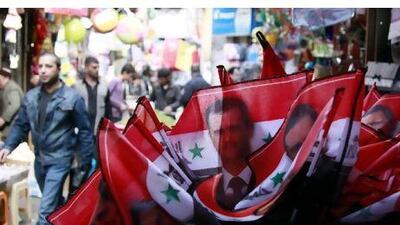DAMASCUS // A flurry of presidential decrees has been issued in Syria this week, in an effort to mollify growing public demands for reform and head off expected protests.
In a country where decision-making has long been notoriously slow paced, with the authorities always insisting that time is on their side, officials now seem to have at least one eye on the clock, with Friday, the day of demonstrations, now a key weekly marker.
Since last Friday's protests, which spread to new areas in the country and saw security forces open fire on demonstrators in a Damascus suburb, at least seven formal orders have been issued by president Bashar al Assad that seem designed to placate anti-government activists or convince the silent majority that meaningful change is taking place.
On Sunday, a decree named former agriculture minister Adel Safar as the new prime minister, following the sacking of Naji Otri's government. Decrees were also issued to give retired state employees - the majority of the national workforce - health insurance benefits, while farmers in drought-ravaged eastern Syria were told they do not have to pay fines on unpaid irrigation fees.
Then, yesterday, Mohammad Khalid al Hanous was sworn in as the new governor for Deraa, replacing the reviled Faisal Kalthum. Deraa, 100 kilometres south of Damascus, has been an epicentre for anti-government protests since the first demonstrators there were shot and killed by security forces on March 18, sparking an unprecedented nationwide outbreak of public dissent. One of Deraa's demands had been for the former governor to be sacked.
Also yesterday, a presidential order established a privately funded Islamic university, the first of its kind in modern Syria. Analysts say that step was taken as a reward to the nation's Islamic clerical establishment, which has thus far firmly toed the government's line and used its influence to stop the Sunni Muslim majority from joining protesters.
While such minor steps fall far short of the sweeping reforms that demonstrators have been demanding, Syrian political analysts say the authorities are trying to bolster their support and, crucially, have had to react to a fast-moving agenda being set by the public.
One Syrian political analyst, speaking anonymously, said: "Surely the political leadership is always thinking about the coming Friday. There are now two mechanisms at work here, we have normal governmental procedures which take years to move, and we have the protests which have a weekly timeframe.
"It means that, for the first time in decades, the government is being forced to move to a new timetable that is being set by political activity in the street."
In addition to the presidential decrees, the more significant matter of ending a repressive state of emergency, in place since 1963, appears to have been speeded up this week, in response to last Friday's protests and in an effort to head of the next set of demonstrations.
Mr al Assad had previously tasked a committee to examine draconian martial laws and draw up replacement legislation, giving it a deadline of April 25, something that had angered protesters who want the state of emergency lifted immediately.
Then, on Monday, the privately owned Syrian newspaper al Watan, known for its close ties to Syria's ruling elite, quoted unnamed sources as saying the committee would finish its work before April 8 - this Friday - more than two weeks ahead of schedule, something unheard of in the world of Syrian politics.
"The committee would not have hurried its work in that way if last Friday had been quiet," said another Syrian political analyst, also speaking anonymously because of the heightened state of security in the country.
"We have a saying 'if you want to forget something, set up a committee', so it would have taken months, perhaps years to complete its work if the protests had stopped straight away, " the analyst said. "But, because the public demands are still there and the people are still in the street, they [the authorities] had to move."
Similarly, the ruling elite are keen to stress that a commission set up to investigate the shootings of protesters in Deraa and the port city of Latakia, is making progress in its inquiry. Monday's edition of al Watan said the probe had already questioned "many witnesses" and "will soon end its work".
In addition, another seven human-rights activists, arrested during a protest outside of the interior ministry on March 16, were freed yesterday. The government has said it will release peaceful campaigners who have been imprisoned during recent unrest. Crucially however Kamal Sheiko, who was at the March 16 demonstration, was not freed, while hundreds of others remain in custody.
Protesters have called this week for a new wave of demonstrations, saying that government action so far has been woefully inadequate. On top of ending the state of emergency, activists have said all political prisoners must be freed - there are thought to be more than 3,000 in the country's jails - and that new laws must be passed to would permit opposition parties and usher in democracy.
There have also been loud demands for action to be taken to end the rampant corruption that has enriched the ruling elite but left the majority of Syrians struggling against a rising tide of poverty.
psands@thenational.ae

